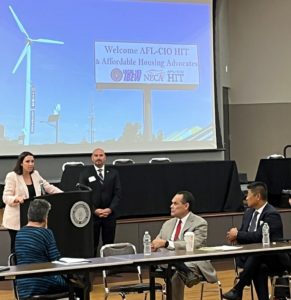News
Local Leaders Tackle Dual Demand for Affordable Housing and Construction Careers
 How can we strengthen our city and region by better connecting housing to jobs and jobs to housing? That was the central question community leaders explored last month in Boston at a roundtable hosted by the AFL-CIO Housing Investment Trust (HIT), International Brotherhood of Electrical Workers (IBEW) Local 103 and the Boston chapter of the National Electrical Contractors Association (NECA).
How can we strengthen our city and region by better connecting housing to jobs and jobs to housing? That was the central question community leaders explored last month in Boston at a roundtable hosted by the AFL-CIO Housing Investment Trust (HIT), International Brotherhood of Electrical Workers (IBEW) Local 103 and the Boston chapter of the National Electrical Contractors Association (NECA).
The group gathered in Dorchester, Massachusetts on June 21 at IBEW Local 103 headquarters to focus on ways to create more affordable housing in New England by utilizing the emerging generation of construction workers trained in union apprenticeships programs.
“The demand for housing that people can afford is matched only by the need to train more workers for good-paying jobs and careers in construction,” said HIT CEO Chang Suh. “Solving for both goes hand in hand because each makes it possible for working families to build a better life.”
According to the Federal Reserve Bank of Boston, high housing costs in the region place significant financial pressure on the state’s residents. At the same time, local contractors report a significant backlog of work and a shortage of workers, as is the case nationwide. The count of open construction jobs in the U.S. jumped to a record-high 449,000 unfilled positions in April, according to a recent Bureau of Labor Statistics report.
The approximately 50 participants in the event represented a diverse cross-section of sectors, including building trades representatives, affordable and rental housing developers, workforce development experts, city and state housing officials, union contractors, as well as HIT senior management and other labor-affiliated investors.
“Leaders in real estate development and workforce development have a mutual, two-fold goal to produce housing which more people can afford while simultaneously recruiting, training and placing the skilled workers needed to build it,” said Kristen Gowin, executive manager of the Electrical Contractors Association of Greater Boston.
A key issue in the discussion was the rising cost of housing in Boston that has made it nearly impossible for these same union construction workers to afford to live there. Roundtable participants agreed the city faces an urgent need to build workforce housing that is affordable and available to a wider range of Bostonians.

“It will continue to take a broad collaboration of partners to finance and build support for the construction of rental housing that is affordable to a full range of households, from our city’s deeply low-income families to those with low-, moderate- and middle-incomes,” said Kate Bennett, administrator and CEO of the Boston Housing Authority.
Developers should consider the advantages of hiring contractors that utilize workers whose skills have been developed by local unions through apprenticeship programs, according to Lou Antonellis, Local 103’s business manager and financial secretary.
“Our apprentices have proven themselves at working hard, working well and working in teams. They’re diverse, they’re local, and they’re skilled. We emphasize diversity, and our apprentices are the workforce that housing developers and their partners expect,” said Antonellis. “And our apprentices graduate debt free because their training costs are provided by the union. That puts them faster on the path to better housing and even homeownership.”
HIT CEO Suh agreed. “Working hands-on to develop several types of housing affordable to a community’s workforce and residents will lead to a better quality of life for those who live in it and for those rising construction professionals who build it,” he said.
About the HIT: The HIT is a fixed-income, investment grade mutual fund with $6.4 billion in net assets. For over 35 years, the HIT has been a leader in putting union and public pension capital to work to produce competitive returns and achieve mission-related collateral objectives. Investors should consider the HIT’s investment objectives, risks and expenses carefully before investing. Investors may view the HIT’s current prospectus, which contains more complete information, on its website at www.aflcio-hit.com and may obtain a copy from the HIT by calling the Marketing and Investor Relations Department collect at 202-331-8055. Investors should read the current prospectus carefully before investing.
Contact: Dianne Ambrose, 202-467-2569, dambrose@aflcio-hit.com
1227 25th Street, NW
Suite 500
Washington, DC 20037
Phone: 202-331-8055
1227 25th Street, NW
Suite 500
Washington, DC 20037
Phone: 202-331-8055